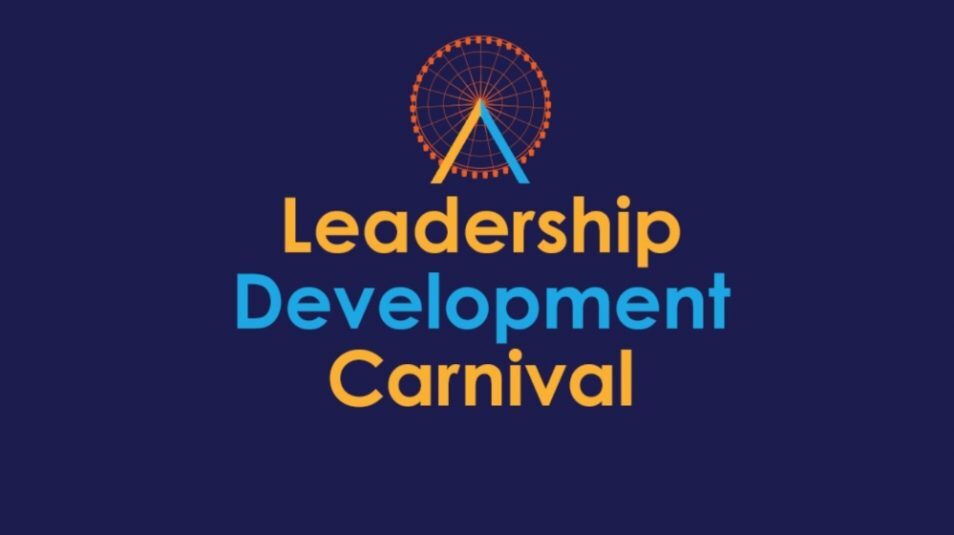Weaving Influence has the privilege of hosting the April 2022 Leadership Development Carnival! We’re excited to share posts from leadership experts from around the globe on the topics of communication, development, engagement, motivation, productivity, team building, and more.
Communication
Priscilla Archangel of Archangel & Associates provided Three Inches of Doubt. Priscilla writes: “When starting and leading a business, project, or initiative of any size, it’s important for leaders to practice behaviors that avoid creating three inches of doubt..” Follow Priscilla on Twitter at @PrisArchangel.
David Grossman of The Grossman Group provided 7 Critical Traits for Building Trust Inside Companies. David shares: “Get key traits leaders should focus on to become more trustworthy (with new data) as we examine the trust problem and offer leaders a go-to playbook for how to build a powerful new level of trust within their company culture. See how building more trust in your organization leads to better business outcomes.” Follow David on Twitter at @ThoughtPartner.
Jennifer V. Miller writes Beyond Your Ears: The Many Ways Leaders Can Listen to Employees. Jennifer summarizes: “Leadership listening isn’t just for one’s ears. Change ‘agility’ requires leaders to listen in multiple ways.” Find Jennifer on Twitter at @JenniferVMiller.
Development
Julie Winkle Giulioni shared Bespoke Development: From Cocktails to Couture to Careers. Julie explains: “The range of bespoke creations available today got me thinking: Might this sort of ‘just-for-me’ mindset be exactly what organizations need right now to elevate engagement, make development relevant, and stem the current tide of resignations? Bespoke career development.” Julie on Twitter at @julie_wg.
Frank Sonnenberg contributed Critical Lessons That They Fail to Teach You in School. Frank explains: “Most people learn life’s most valuable lessons too late in life. Here are 31 facts that will radically improve your life if you embrace them.” Follow Frank on Twitter at @fsonnenberg.
Marcella Bremer of Positive Culture contributed Positive Organizations Care for Positive Impact. Marcella considers: “The pandemic caused an unprecedented change and the IPCC reported accelerated climate change. A positive organizational culture helps to navigate the necessary transition. A positive culture IS a planet culture. Long-term success and return on investment aren’t possible without care for our climate. What’s your impact?” Follow Marcella on Twitter at @MarcellaBremer.
Paula Kiger of Big Green Pen shared A Customer Service Rep’s Unusual Route to Success. Paula writes: “Craig Newmark probably could have stayed CEO of craigslist forever. However, he recognized that he wasn’t the best person for the high-stakes decisions involved and he handed the reins over to someone else. He returned to being a ‘customer service rep’ (and a generous philanthropist.” Connect with Paula on Twitter @biggreenpen.
David Dye of Let’s Grow Leaders provided The Most Challenging Person for a Human-Centered Leader. David shares: “If you’re serious about becoming a more human-centered leader, it’s vital to master one specific relationship: the one with yourself.” Follow David on Twitter at @davidmdye.
Karin Hurt of Let’s Grow Leaders provided The Simplest Way to Get Better Results from Your Team. Karin shares: “If you want to empower your team to find more creative ways to get better results, start by defining success.” Follow Karin on Twitter at @letsgrowleaders.
Wally Bock of Three Star Leadership provided Willie Mays and “The Catch:” Rules for Performance. Wally explains: “There’s more to ‘The Catch’ than just the catch.” Connect with Wally on Twitter at @WallyBock.
S. Chris Edmonds of The Purposeful Culture Group provided Culture Leadership Charge: Preconceived Notions May Steer You Wrong. In this video post, Chris shares: “Business leaders today have a lot on their minds – and on their plates. They juggle hiring challenges. Mask mandates. Retaining talented players. Vaccine guidelines. Supply chain issues. Generating revenue. All these tasks are demanding, requiring attention and intention every minute.” Follow Chris on Twitter at @scedmonds.
Jon Verbeck provided How CEOs Can Transform Financial Stress Into Success. Jon writes: “It is said that the bigger your business, the bigger your problems. But effective leaders can handle the challenges, if they are prepared. The key is to notice potential problems early enough to let you develop a plan and be ready to execute early to avoid or soften the impact.” Follow Jon on Twitter at @jonverbeck1.
Randy Conley of Leading with Trust shared It’s Time to Turn Your Leadership Inside Out and Upside Down. Randy shares: “Life has been turned inside out and upside down the last few years, hasn’t it? You may not want to hear this, but your leadership needs to be turned inside out and upside down, too. In this post, I share why leaders need to abandon outdated models of leadership and embrace new ways of leading to meet the needs of today’s workforce.” Connect with Randy on Twitter at @RandyConley.
ENGAGEMENT
Ken Byler of Higher Ground Consulting Group contributed March Madness Leadership Lessons. Ken writes: “Success in business and life isn’t always about winning. In most cases it’s more about playing the game well, giving it your very best, and learning from every experience. You may not be mad about March, in a basketball sense, but you can still learn something from this annual celebration of college sportsmanship.”
Braden Kelley provided A Guide to Organizing Innovation. Braden shares: “I recently read a couple of excellent articles by Nick Skillicorn, and Prof. Rita McGrath where both discuss the challenges and intricacies involved in structuring and governing innovation within a large organization. This is a classic topic that every corporate innovator has without a doubt come across, and it’s also one where “the right approach” is often quite elusive.” Follow Braden on Twitter at @innovate.
team building
Sean Glaze of Great Results Team Building shared The Secret to Reduce Turnover in the Great Resignation is Recruiting the Team That You Have. Sean writes: “Onboarding and recruitment are exciting – and most organizations take time and make effort to ensure their NEW people feel appreciated and valued and special. But sometimes in our pursuit of quality new teammates to grow our organization, we neglect to remind those who are already there – the ones putting in work each day – that they are still tremendously valued and appreciated.” Find Sean on Twitter at @leadyourteam.
Jim Taggart of Changing Winds shared Lessons in Teamwork: Winning Despite Trenchfoot, Leeches and Hunger. Jim considers: “Leadership in a well functioning team is not a dictatorship. Leadership must be shared. And when placed under pressure it is remarkable from where leadership often emerges from a team’s members.” Follow Jim on Twitter at @JlcTaggart.
Bill Treasurer of Giant Leap Consulting contributed The Impact of Organizational Culture. Bill explains: “No matter how you define it, your organizational culture is clear to everyone who walks through the front door. And in the current staffing environment, it also determines who walks out.” Follow Bill on Twitter at @btreasurer.
Diana Peterson-More shared Teamwork: The Whole is Greater than the Sum of Its Parts.Teamwork: The Whole is Greater than the Sum of Its Parts.. Diana explains: “Teamwork is a much over-used and frequently misunderstood workplace style. Teams often start with energy, purpose, and optimism and then fail, leaving team members discouraged, disappointed, and even some with hurt feelings? Why? This post focuses on the five critical elements shared by successful teams and how to achieve them. It also answers the question “why do teams fail?” offering tips on how to achieve success.” Find Diana on Twitter at @DianaPMAuthor.
Steve DiGioia contributed I Talk About People Behind Their Back. Steve writes: “I don’t gossip or finger-point. I don’t assign blame or give putdowns. I don’t accuse or assume faults. No, I don’t. But I do talk about people behind their back. I don’t spy on them, but I do pay attention. I see what they’ve been doing. I notice. I observe. I take notes. I remember. I talk about people behind their back. They may not know it, but I do. And I try to do it often. And you should do it too!” Find Steve on Twitter at @stevedigioia.
Ken Downer of Rapid Start Leadership provided The 18th Mile – It’s Not the Finish Line Leaders Should Focus On. Ken shares: “Whether you are running a marathon, or leading a marathon project of some other kind, the key to getting to the end isn’t focusing on the finish line, but on what happens in the 18th mile. Here are seven ways we can prepare for that moment, and lead our teams successfully through it.” Follow Ken on Twitter @RapidStartLdr.
Creativity/Inspiration
Brenda Yoho writes You have Potential. Brenda explains: “To truly know your potential, you have to know where you want to go! Like Alice in Wonderland, you really can’t trust to ask someone else which direction to go. Turning to yourself and understanding who you are, what you want to do, and who you want to become are all questions you can answer. Read on to discover your full potential.” Find Brenda on Twitter at @BrendaYoho.
Lisa Kohn of Chatsworth Consulting Group shared Do What Makes You Come Alive. Lisa shares: “When we spend time doing what makes us come alive, we have more to give; we have more excitement for our work, and we have greater results.” Connect with Lisa on Twitter at @ThoughtfulLdrs.
And More…
Laura Schroeder of Working Girl provided Finding Your Flow in the Post-Pandemic World of Work. Laura shares: “This article spotlights the hidden costs of flow killers at work in terms of mental health and organizational performance, and how to minimize distractions and improve flow across the business.” Connect with Laura on Twitter at @workgal.
Dana Theus of InPower Coaching writes Women’s History Month: Do We Need Power to Make A Difference? Dana explains: “Like many women, I’ve often felt I don’t need the trappings of power to feel powerful and I don’t need to be recognized to make a difference. I still believe this. But on looking more deeply at the dynamics of power and leadership, and the legacy wisdoms about them that have been bequeathed to us by history, I’ve shifted my views a bit. Today I feel more comfortable believing that women need to wield power to make a difference.” Find Dana on Twitter at @DanaTheus.
Thank you to everyone who submitted articles for this month’s carnival! If you would like to be added to the distribution list for submission calls, please fill out this form and we’ll be happy to add you to the list.

Kelly expertly supports authors through their book launches through strategic account management, with a specialization in mobilizing their networks and building impactful launch teams. She coaches authors throughout her launch management on how to best influence bestseller opportunities and secure Amazon reviews, ultimately increasing visibility, media coverage, and opportunities for growth and success.


Thank you for including my post. It’s a pleasure to share the stage with so many other wonderful writers.